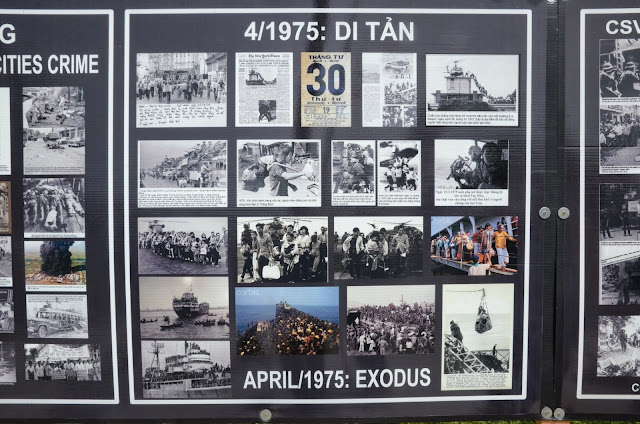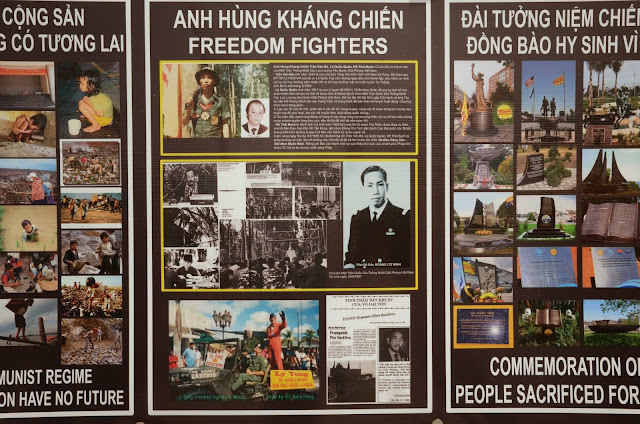

Đạo luật S-219 do TNS Ngô Thanh Hải khởi xướng và vận động đã được công nhận. Canada từ nay, hàng năm gọi ngày 30 tháng tư là NGÀY THÁNG TƯ ĐEN...
////////////
Thị Trưởng Thành Phố Ottawa, Ông Jim Waston công bố ngày 30 tháng 4 năm 2014 là
NGÀY THÁNG TƯ ĐEN
Nhân mùa Quốc Hận 30-4 sắp tới, để tưởng niệm 39 năm ngày CSVN cưỡng chiếm miền Nam Tự Do, đồng thời đánh dấu 39 năm chế độ bạo tàn CSVN ngự trị trên quê
hương, tạo nên vạn nỗi đau thương cho dân tộc Việt Nam.
Cộng Đồng Người Việt Ottawa cùng nhau đốt nén hương lòng để tưởng niệm đến những đồng bào đã bỏ mình trên biển cả, trong rừng sâu nước độc trên đường đi tìm tự do. Ghi ơn những Chiến Sĩ, Quân Dân Cán Chính Việt Nam Cộng Hòa can trường năm nào, dù còn sống nơi quê nhà hay ven trời góc biển, hay nằm yên trong đáy mộ hoang tàn, hay xương cốt còn rải rác chốn rừng hoang và vùi thây nơi những trại tù oan nghiệt.
Cộng Đồng Người Việt Ottawa cũng ghi nhận sự đóng góp thiết thực của đồng bào Tỵ Nạn Cộng Sản vào sự phát triển một xã hội đa văn hóa của thành phố Ottawa.
Thượng Nghị Sĩ (TNS) Ngô Thanh Hải của Canada đã đến gặp Ông Thị Trưởng Thành Phố Ottawa, Ông Jim Waston và đã được ông Thị Trưởng Thành Phố Ottawa công bố rằng ngày 30 tháng 4 năm 2014 là ngày Quốc Hận của thành phố Ottawa.

Ông Thị Trưởng thành phố Ottawa Jim Waston và TNS Ngô Thanh Hải

////////////
Văn bản bằng Anh ngữ

PARLIAMENT of CANADA
S-219
Second Session, Forty-first Parliament,
62-63 Elizabeth II, 2013-2014
SENATE OF CANADA
An Act respecting a national day of commemoration of the exodus of Vietnamese refugees and their acceptance in Canada after the fall of Saigon and the end of the Vietnam War
FIRST READING, APRIL 10, 2014
THE HONOURABLE SENATOR NGO
1334
SUMMARY
This enactment designates the thirtieth day of April in each and every year as “Black April Day”.
Available on the Parliament of Canada Web Site at the following address:
http://www.parl.gc.ca
2nd Session, 41st Parliament,
62-63 Elizabeth II, 2013-2014
Senate of Canada
BILL S-219
An Act respecting a national day of commemoration of the exodus of Vietnamese refugees and their acceptance in Canada after the fall of Saigon and the end of the Vietnam War
Preamble
Whereas the Canadian Forces were involved in the Vietnam War with supervisory operations to support the aim of establishing peace and ending the Vietnam War by assisting in the enforcement of the Paris Peace Accords of 1973;
Whereas on April 30, 1975, despite the Paris Peace Accords, the military forces of the People’s Army of Vietnam and the National Liberation Front invaded South Vietnam, which led to the fall of Saigon, the end of the Vietnam War and the establishment of a single-party socialist government;
Whereas the United Nations High Commissioner for Refugees has reported that these events and the conditions faced by individuals in Vietnam, including deteriorating living conditions and human rights abuses, contributed to the exodus of approximately 840,000 Vietnamese people, who were referred to at the time as “Vietnamese boat people”, to neighbouring countries in the ensuing years;
Whereas the United Nations High Commissioner for Refugees has reported that at least 250,000 Vietnamese people lost their lives at sea during the exodus of the Vietnamese people for reasons that included drowning, illness, starvation and violence from kidnapping or piracy;
Whereas the sponsorship refugee program in Canada, assisted by the efforts of Canadian families, Canadian charities, religious groups and non-governmental organizations, contributed to Canada accepting more than 60,000 Vietnamese refugees, among whom it has been estimated that 34,000 were privately sponsored and 26,000 were assisted by the Canadian government;
Whereas the major and sustained contribution by the people of Canada to the cause of refugees was recognized by the United Nations High Commissioner for Refugees when it awarded the Nansen Refugee Award to the “People of Canada” in 1986;
And whereas April 30 is referred to by many members of the community of displaced Vietnamese people and their families in Canada as “Black April Day” and is, therefore, an appropriate day to designate as a day to remember and commemorate the lives lost and the suffering experienced during the exodus of Vietnamese people, the acceptance of Vietnamese refugees in Canada, the gratitude of Vietnamese people to the Canadian people and the Government of Canada for accepting them, and the contributions of Vietnamese-Canadian people — whose population is now approximately 300,000 — to Canadian society;
Now, therefore, Her Majesty, by and with the advice and consent of the Senate and House of Commons of Canada, enacts as follows:
SHORT TITLE
1. This Act may be cited as the Black April Day Act.
BLACK APRIL DAY
2. Throughout Canada, in each and every year, the thirtieth day of April shall be known as “Black April Day”.
Not a legal holiday
3. For greater certainty, Black April Day is not a legal holiday or a non-juridical day.
Published under authority of the Senate of Canada
///////////
Văn bản bằng Pháp ngữ
2e session, 41e législature,
62-63 Elizabeth II, 2013-2014
sénat du Canada
PROJET DE LOI S-219
Loi instituant une journée nationale de commémoration de l’exode des réfugiés vietnamiens et de leur accueil au Canada après la chute de Saïgon et la fin de la guerre du Vietnam
Attendu :
que les Forces canadiennes ont pris part à la guerre du Vietnam dans le cadre d’opérations de surveillance menées pour appuyer l’objectif de rétablir la paix et de mettre fin à la guerre du Vietnam, en aidant à assurer le respect des Accords de paix de Paris de 1973;
que le 30 avril 1975, malgré les Accords de paix de Paris, les forces militaires de l’Armée populaire vietnamienne et du Front national de libération ont envahi le Vietnam du Sud, ce qui a entraîné la chute de Saïgon, la fin de la guerre du Vietnam et l’établissement d’un gouvernement socialiste à parti unique;
que, selon le Haut Commissariat des Nations Unies pour les réfugiés, ces événements ainsi que la situation vécue par les gens du Vietnam, notamment la détérioration des conditions de vie et les violations des droits de la personne, ont contribué à l’exode de quelque 840 000 d’entre eux — appelés à l’époque les « réfugiés de la mer vietnamiens » — vers les pays voisins au cours des années qui ont suivi;
que, d’après un rapport du Haut Commissariat des Nations Unies pour les réfugiés, au moins 250 000 Vietnamiens sont décédés en mer au cours de cet exode en raison notamment des noyades, de la maladie, de la famine et des violences liées aux enlèvements ou aux actes de piraterie;
que, grâce aux efforts des familles canadiennes et à ceux des groupes religieux, des organismes de bienfaisance et des organismes non gouvernementaux du Canada, le programme canadien de parrainage des réfugiés a permis d’accueillir au pays plus de 60 000 réfugiés vietnamiens, parmi lesquels, selon les estimations, 34 000 ont été parrainés par des organismes du secteur privé et 26 000 ont reçu l’aide du gouvernement canadien;
que le Haut Commissariat des Nations Unies pour les réfugiés a reconnu la contribution importante et soutenue de la population canadienne à la cause des réfugiés lorsqu’il a décerné la distinction Nansen pour les réfugiés au « peuple canadien » en 1986;
qu’il convient de désigner le 30 avril — que de nombreux membres de la communauté des Vietnamiens déplacés et leurs familles au Canada reconnaissent déjà comme « jour de l’Avril noir » — en tant que journée pour commémorer les vies perdues et la souffrance vécue lors de l’exode du peuple vietnamien, souligner l’accueil des réfugiés vietnamiens par la population et le gouvernement du Canada et la gratitude du peuple vietnamien à l’égard cet accueil, et reconnaître les contributions apportées par les Vietnamo-Canadiens — aujourd’hui au nombre d’environ 300 000 — à la société canadienne,
Sa Majesté, sur l’avis et avec le consentement du Sénat et de la Chambre des communes du Canada, édicte
TITRE ABRÉGÉ
1. Loi sur le Jour de l’Avril noir.
JOUR DE L’AVRIL NOIR
2. Le 30 avril est, dans tout le Canada, désigné comme « Jour de l’Avril noir ».Jour de l’Avril noir
3. Il est entendu que le Jour de l’Avril noir n’est pas une fête légale ni un jour non juridique. Statut
Publié avec l’autorisation du Sénat du Canada















































































Comment